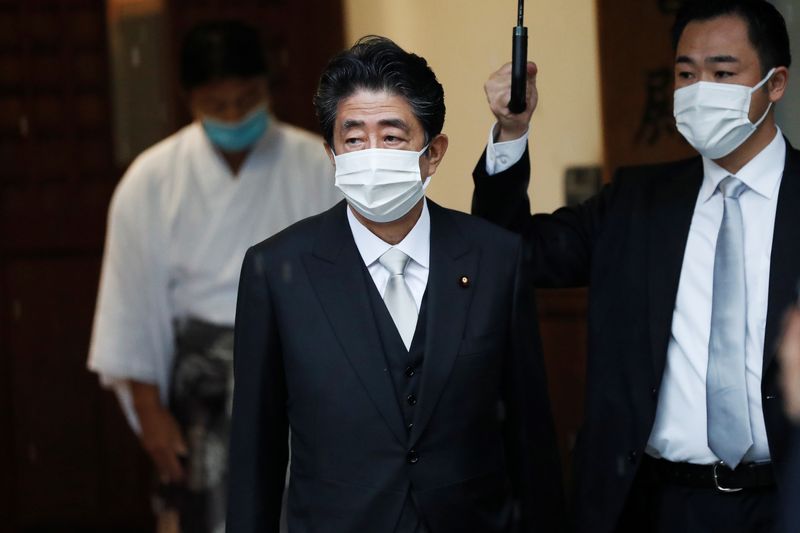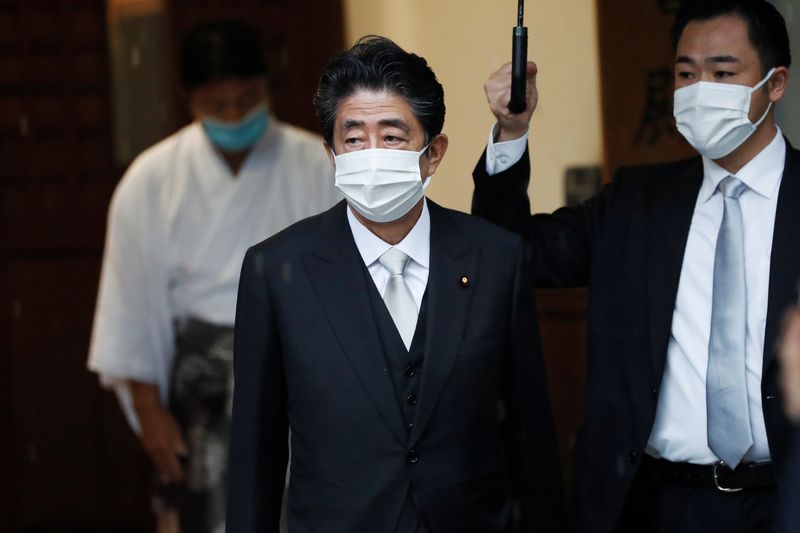By Satoshi Sugiyama and Chang-Ran Kim
NARA, Japan (Reuters) -Former Prime Minister Shinzo Abe, the longest-serving leader of modern Japan, was gunned down on Friday while campaigning for a parliamentary election, shocking a country where guns are tightly controlled and political violence almost unthinkable.
Abe, 67, was pronounced dead around five and a half hours after the shooting in the city of Nara. Police arrested a 41-year-old man and said the weapon was a homemade gun.
"I am simply speechless over the news of Abe's death," Prime Minister Fumio Kishida, Abe's protege, told reporters.
Earlier, as Abe still lay in hospital where doctors tried to revive him, Kishida struggled to keep his emotions in check.
"This attack is an act of brutality that happened during the elections - the very foundation of our democracy - and is absolutely unforgivable," he said.
Abe had been making a campaign speech outside a train station when two shots rang out. Security officials were then seen tackling a man in a grey T-shirt and beige trousers.
"There was a loud bang and then smoke," businessman Makoto Ichikawa, who was at the scene, told Reuters. "The first shot, no one knew what was going on, but after the second shot, what looked like special police tackled him."
Kyodo news service published a photograph of Abe lying face-up on the street by a guardrail, blood on his white shirt. People were crowded around him, one administering heart massage.
Abe was taken to hospital in cardiopulmonary arrest and showing no vital signs. He was declared dead at 5:03 p.m. (0803 GMT), having bled to death from deep wounds to the heart and the right side of his neck.
He had received more than 100 units of blood in transfusions over four hours, Hidetada Fukushima, the professor in charge of emergency medicine at Nara Medical University Hospital, told a televised news conference.
Police said the gunman had admitted to shooting Abe with a handmade firearm he had fashioned out of metal and wood.
Media reported his name as Tetsuya Yamagami. Police said he was a Nara resident who worked at Japan's Maritime Self-Defence Forces for three years but now appeared to be unemployed. They were investigating whether he had acted alone.
Investigators found "several" other handmade guns at his one-room flat in Nara city, police added.
The suspect said he bore a grudge against a "specific organisation" and believed Abe was part of it, and that his grudge was not about politics, the police said, adding it was not clear if the unnamed organisation actually existed.
FLOWERS LAID
Members of the public laid flowers near the spot where Abe fell. TV Asahi reported that Abe's body would be transferred to his Tokyo home on Saturday.
It was the first killing of a sitting or former Japanese leader since a 1936 coup attempt, when several figures including two ex-premiers were assassinated.
Post-war Japan prides itself on its orderly and open democracy. Senior Japanese politicians are accompanied by armed security agents but often get close to the public, especially during political campaigns when they make roadside speeches and shake hands with passersby.
In 2007, the mayor of Nagasaki was shot and killed by a yakuza gangster. The head of the Japan Socialist Party was assassinated during a speech in 1960 by a right-wing youth with a samurai short sword. A few other prominent politicians have been attacked but not injured.
Two years since stepping down, Abe had remained a dominant presence over the ruling Liberal Democratic Party (LDP), controlling one of its major factions.
Kishida, who won the premiership with Abe's backing, said the LDP would continue election campaigning on Saturday to demonstrate its resolve to "never give in to violence", and to defend a "free and fair election at all cost".
'STUNNED, OUTRAGED'
"I am stunned, outraged, and deeply saddened by the news that my friend Abe Shinzo, former Prime Minister of Japan, was shot and killed while campaigning," U.S. President Joe Biden said in a statement.
"This is a tragedy for Japan and for all who knew him... He was a champion of the alliance between our nations and the friendship between our people."
The United States is Japan's most important ally.
Similar messages of sympathy and shock poured in from around the world following news of Abe's death, including from neighbouring Taiwan, China and Russia, as well as from across Asia, Europe and the Americas.
The yen rose and Japan's Nikkei index fell on news of the shooting, partially driven by a knee-jerk flight to safety.
Abe is best known for his “Abenomics” policy of aggressive monetary easing and fiscal spending.
He also bolstered defence spending after years of declines and expanded the military’s ability to project power abroad.
In a historic shift in 2014, his government reinterpreted the postwar, pacifist constitution to allow troops to fight overseas for the first time since World War Two.
The following year, legislation ended a ban on exercising the right of collective self-defence, or defending a friendly country under attack.
Abe, however, never achieved his goal of revising the U.S.-drafted constitution by writing the Self-Defense Forces, as Japan’s military is known, into the pacifist Article 9.
Abe hailed from a wealthy political family that included a foreign minister father and a grandfather who served as premier.

He first took office in 2006 as Japan’s youngest prime minister since World War Two. After a year plagued by political scandals and an election drubbing, Abe quit citing ill health.
He became prime minister again in 2012, winning three election landslides in a row before stepping down in 2020, again citing his health.
